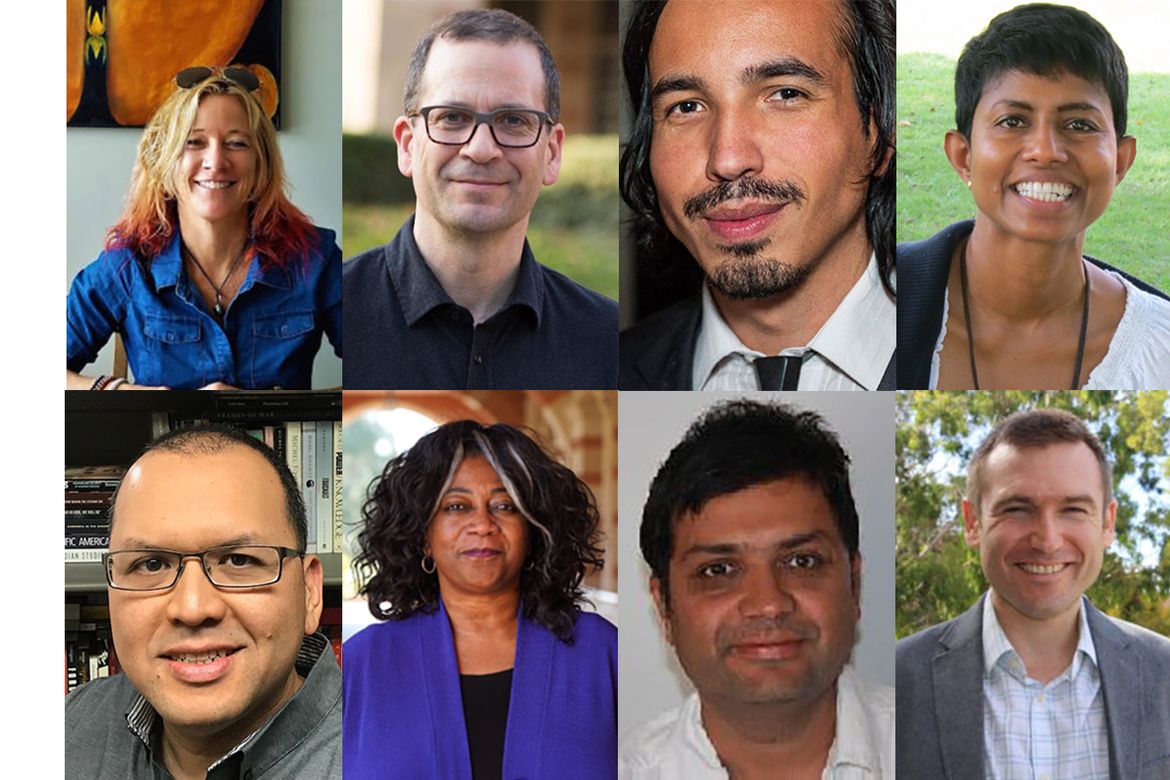UCLA led all universities and academic institutions in 2021 with eight professors selected to receive fellowships from the John Simon Guggenheim Memorial Foundation.
The UCLA faculty named as fellows are: Priyanga Amarasekare, professor of ecology and evolutionary biology; Kamari Clarke, professor of anthropology; Keith Camacho, associate professor of Asian American studies; Elizabeth DeLoughrey, professor of English; Suhas Diggavi, professor of electrical and computer engineering; David Goldstein, associate professor of linguistics and Indo-European studies; Chon Noriega, distinguished professor of film, television and digital media; and Rodrigo Valenzuela, assistant professor of photography.
Created in 1925 by Simon and Olga Guggenheim in memory of their son John Simon Guggenheim, the foundation has offered fellowships to exceptional individuals in pursuit of scholarship in any field of knowledge and creation in any art form, under the freest possible conditions.
This year the foundation awarded fellowships to 184 American and Canadian scientists and scholars in the social sciences and humanities, as well as writers and artists of all kinds selected via a rigorous peer-review process from almost 3,000 applicants.
- Priyanga Amarasekare’s Lab focuses on research around mechanisms that maintain biological diversity in variable environments. She approaches her practice from both an ecological and an evolutionary perspective, using a combination of observation, experimentation and mathematical modeling. Amarasekare will use the fellowship to investigate the biochemical basis underlying ecological and evolutionary responses to climate warming.
- Kamari Clarke has more than 20 years of experience conducting research on issues related to legal institutions, human rights and international law, religious nationalism and the politics of race and globalization. One of her key contributions to her various disciplines has been to demonstrate ethnographically the ways that religious and legal-knowledge regimes produce practices that are adopted on a global scale.
- Keith Camacho is a historian of Chamorros — the indigenous people of the Mariana Islands of Guam — and other Pacific Islanders. He has published widely on empire, gender, militarism, race and sovereignty in the Mariana Islands, Oceania and the broader Asia-Pacific region. His research agenda extends these issues to U.S. colonial law and to its imperial regimes of freedom, punishment and surveillance in the Pacific.
- Elizabeth DeLoughrey, who also holds an appointment at the UCLA Institute of the Environment and Sustainability, has published a number of books about postcolonial and Indigenous literatures and the arts, particularly in relation to the environment, climate change and the Anthropocene — the geologic era of human modification of the natural world.
- Suhas Diggavi researches information theory and its applications for learning, security and privacy, wireless networks, bio-informatics and neuroscience. In 2019, Diggavi received a Google Faculty Research Award.
- David Goldstein uses methods and insights from theoretical linguistics to understand how languages change. His research focuses on the syntax and semantics of the archaic Indo-European languages, in particular Latin, Greek, Sanskrit and the Anatolian languages.
- Chon Noriega, who is also director of the UCLA Chicano Studies Research Center, is author and editor of numerous books dealing with Latino media, performance and visual art. Noriega has been active in media policy and professional development, for which Hispanic Business named him as one of the Top 100 Most Influential Hispanics. Noriega has also helped recover and preserve independent films and video art, including the first Chicano-directed feature film, “Please, Don’t Bury Me Alive!” (1976).
- Rodrigo Valenzuela works in the mediums of photography, video, painting and installation. Using autobiographical threads to inform larger universal fields of experience, his work constructs narratives, scenes and stories that point to the tensions found between the individual and communities. Valenzuela, who was born in Chile and is now based in Los Angeles, focuses much of his work on the experiences of undocumented immigrants and laborers.
The wide range of backgrounds, fields of study, and accomplishments of Guggenheim Fellows is a unique characteristic of the fellowship program. In all, 49 scholarly disciplines and artistic fields, 73 different academic institutions, 28 states and 2 Canadian provinces are represented in this year’s class of fellows, who range in age from 31 to 85. Close to 60 Fellows have no full-time college or university affiliation.
Since its establishment in 1925, the John Simon Guggenheim Memorial Foundation has granted nearly $400 million in fellowships to more than 18,000 individuals, among whom are more than 125 Nobel laureates, members of all the national academies, winners of the Pulitzer Prize, Fields Medal, Turing Award, Bancroft Prize, National Book Award, and other internationally recognized honors.




